‘The Crown’ Star Elizabeth Debicki On Finding Princess Diana’s Narrative In A Sea Of Subjective Views
- Oops!Something went wrong.Please try again later.
- Oops!Something went wrong.Please try again later.
- Oops!Something went wrong.Please try again later.
- Oops!Something went wrong.Please try again later.
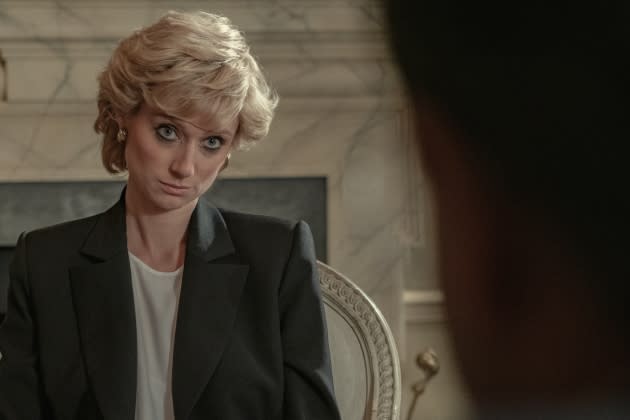
When Elizabeth Debicki auditioned for a minor role in The Crown, the thought that she might one day play Lady Diana Spencer didn’t even cross her mind until the show’s casting director planted the seed. Now, marking her second season in the Diana-verse, she’s paired her talent and passion for research to embody the troubled royal. Following Emma Corrin’s Emmy-nominated turn as Princess Diana earlier in the show, Debicki’s version of the people’s princess starts out much less hopeful—after an upsetting second honeymoon, it becomes impossible for Diana to ignore that her marriage to Prince Charles is failing.
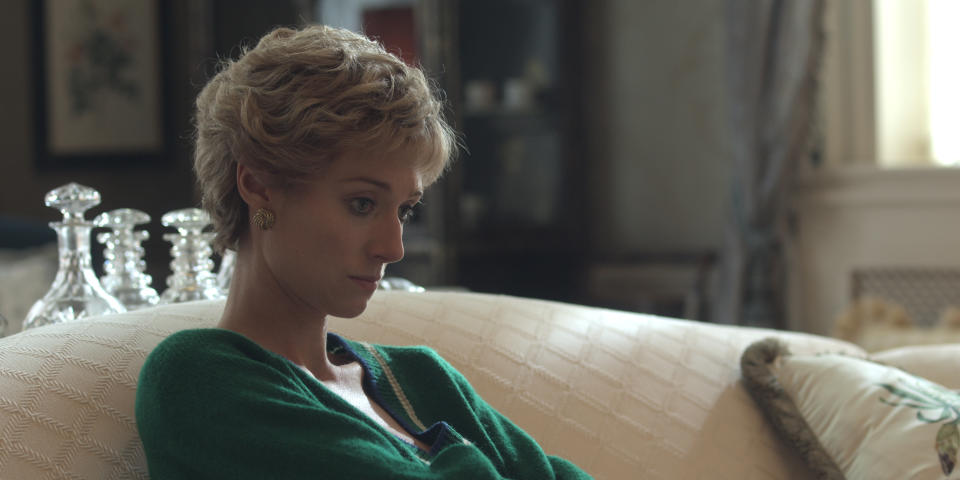
DEADLINE: How did you get involved with The Crown?
More from Deadline
ELIZABETH DEBICKI: I auditioned for a small part in Season 2, and I was in London doing a play at the time. Robert Sterne, the brilliant casting director, was holding auditions, because as you know, there are so many cameo parts in The Crown. I went in and auditioned for it, and did not get that part, but they saw something Diana-y in the audition, unintentionally. So, a combination of me doing bad acting and somehow good acting at the same time.
They called my agent, saying, “Not that part, but we’d like to keep her in the Diana-mix,” which was about 4,000 years down the road. So, I thought, ‘Oh, well, better luck next time.’ I had hoped, as one does, especially in the beginning of your career, when people say things all the time. They would say, “You know what? You would be amazing in this or that,” and there’s a piece of you that hopes it’s going to come to fruition. But you don’t really let yourself believe it, because then you’d be constantly shattered by a sense of rejection.
I probably told my sister about it at the time or something, but then about four or five years later, they actually came back around, and they said, “Oh yeah, you’ve always been the person that we had in mind. Would you be interested?” By that point, Emma [Corrin] had already been cast and they had begun to shoot Season 4 Diana. I remember hearing about Emma being cast, and thinking, again, ‘Oh well, better luck next time.’ Because I didn’t know how many seasons they were intending to do. That’s how it happened. It’s a strange road to what has ended up being the most amazing job of my career, and yeah, did not see it coming really, although I had hoped it would come.
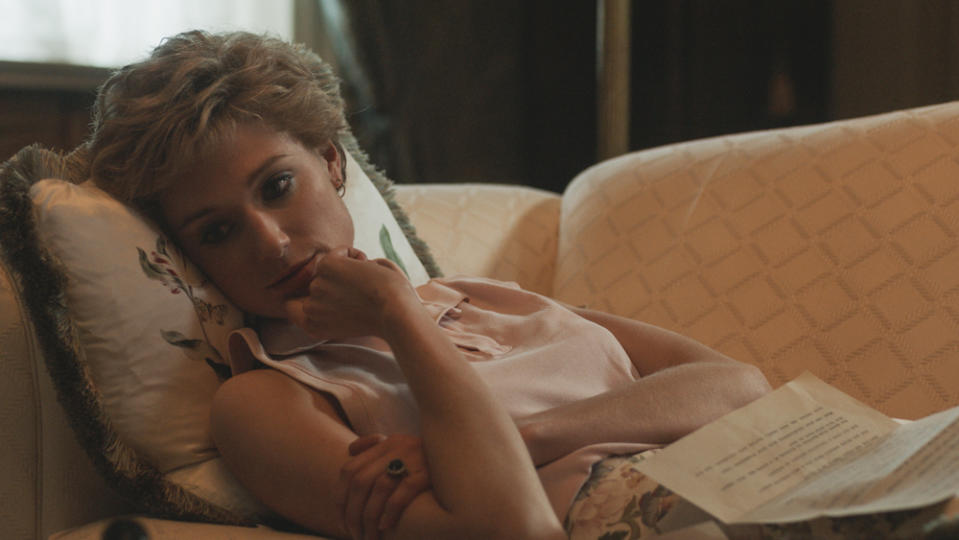
DEADLINE: When you were auditioning, did it even register in your mind that this would lead to playing Princess Diana?
DEBICKI: No. I’d never tell anyone what the role I auditioned for was, because the person who ended up playing it was amazing. Also, I was so physically wrong for that part. I was really confused that they had even asked me to come in and read. But my agent was absolutely right, as she always is. Hylda Queally is always right, have it on record. She said, “Just go in and do it.” Because Season 1 had just come out a week or two before, and I had binged the whole thing. My friend Vanessa [Kirby] was playing Princess Margaret, and it was like this huge television event, Season 1 of The Crown. It was so lush and beautiful and expensive, and everyone was doing such good acting. I was like, “Holy hell, this is the best TV I’ve ever seen.” When they said, “Come in and do it,” I said, “Absolutely.”
DEADLINE: Did you watch Emma Corrin’s Diana portrayal before you started work?
DEBICKI: Yes, that’s the really unique thing about this show, which is kind of an extraordinary thing to do. But also, I would be lying if I said it didn’t add a layer of pressure onto the actors who come in after, because everybody is so good in the show. It’s like a baton pass. And what they did was so beautiful and nuanced and had this openness. I also immediately could see that the two of us were going to be playing very different eras of this character, and that there was going to be a severing in terms of just chunks of history, or an essence of an era.
One was definitely going to feel younger and in the ’80s, and all the history and memory we have associated with that incarnation of that character. Then I was going to pick it up and it was going to feel like a page turn, like a different chapter. That helped me understand my task in a way as well, because I am older than Emma. And I knew that my Diana was going to have a slightly different load on her shoulders, if that makes sense.
DEADLINE: In trying to recreate a real-life character, what was your research process like?
DEBICKI: It was extensive, and it was definitely the most research I’ve ever done for anything, and may ever do for anything. It was driven by both fear and curiosity, a winning combination for extensive reading, and also facilitated by the Archival Research Department. I was in Australia at the time, during Covid, and I got on a Zoom with this amazing woman named Annie who runs the research department. And Annie is a very straightforward New Yorker. Annie said, “How much do you want?” And I said, “Just give me all of it.” And she gave me this look like, “OK.” Then lo and behold, some enormous UPS truck comes to my house in Australia, and it was full to the brim. It was books, it was research, it was just printouts from the archives… Don’t worry, I recycled all of it.
I just sat there with my highlighter on the couch in the blazing hot Australian summer. I just worked my way through it. It was a joy really, because I’m a research history nerd. It’s very natural for my brain to want to be very thorough with that more analytical side of research and character. Obviously, there’s also hours of video archive. In the end, it was a combination of understanding the structural factual framework that the series was going to take.
For the second honeymoon episode, there’s all this very factual research. Which is the tent pole that the then imaginative interpretation is hung on. I let myself understand the framework quite deeply, so that it would inform the psychological journey. Then I just watched a lot of footage really, because obviously a part of doing The Crown is trying to embody the essence, the physicality, the vocal impression of the person. That just takes a long time for me to get, because you can’t really rush it, because then you’re probably going to be reaching for it. I knew that I had to pull out all my little nerdy stops, and really do my homework, because on that first day it was pretty terrifying. If I hadn’t layered in all that research for a really long time, I think I would’ve felt a bit lost. But I didn’t, I did my homework.
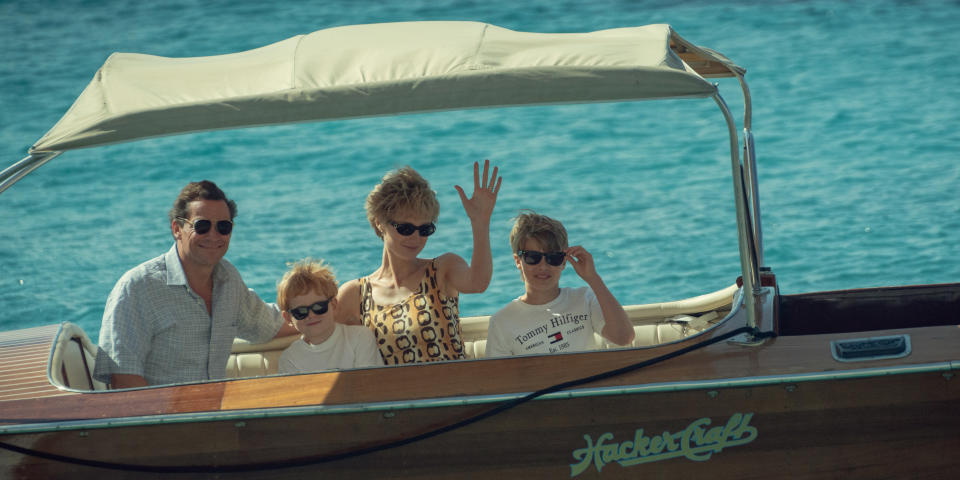
DEADLINE: When you’re watching these videos, what were some of the important mannerisms or idiosyncrasies that you needed to learn to play Diana?
DEBICKI: Well, I think for all these characters, it’s quite interesting because we have so much footage of them. As soon as you get into the ’90s, there’s just that 24-hour news cycle that really got filled up by so much royal news. If you ask a normal somebody on the street, “What does Princess Diana look like when she speaks? Or what does Charles do with his body?” People can do a mirroring, it’s very deeply in our collective consciousness. Obviously one of the things for Princess Diana, was the way that she moved her head, and the way she looked at people. So, that was the most obvious place to start. But then it’s also mapping the body through space. As an actor, you have to think, ‘I can see there’s a shape in the body that is something that we recognize as belonging to this individual, but why does this person move through space like that? What’s the psychology behind it?’
I think to this day, the royal family are still plagued by ‘body language experts’ being like, “This is why they put their hand in this pocket. This is why they get out of the car on this side.” Because when people are that much public-facing, when they’re being viewed so much, I think it’s natural that the body learns how to navigate that very unnatural experience of being looked at by thousands of people all the time. It’s just something that your body would do to protect you from that gaze. It’s a whole bunch of that—figuring out and imagining why. Then, of course, you have to start to practice it so that it feels natural. The same thing goes for the voice as well because, as a viewer of The Crown, one of the things I always found really satisfying was how accurate the dialects seemed to be that all the actors were doing.
Especially when you go back into the olden days of The Crown series. It’s such a funny pleasure you got out of thinking, ‘Oh my God, did people really speak like that?’ And then you go back and you find archival footage of Margaret or someone addressing something and you realize that really is how people sounded.
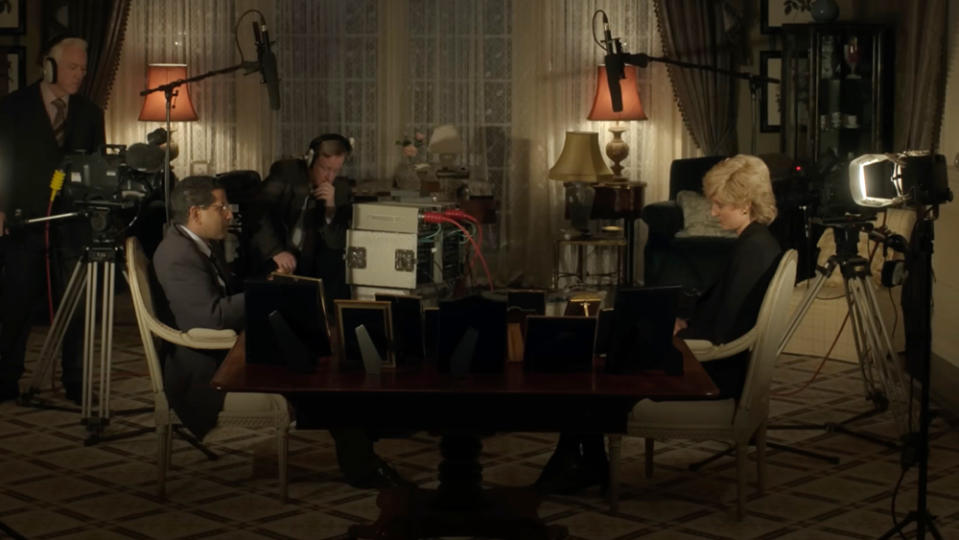
DEADLINE: As you’re talking about this ’90s media cycle where royals were covered all the time, there were many people, tabloids or the royal family that wanted to push their own narrative of who Diana was. Was it difficult to find the “real Diana“ in your research?
DEBICKI: It is difficult. And I think in the end, no one would know who that real person was except her and probably her boys and Charles, and people who were very intimate with her. My avenue to trying to get close to that was a combination of things. One of the things I learned very quickly was when I tried to read books written about her, even by people who had been very close to her, people who had worked for her or friends… At a certain point of reading it, I always shut the book angrily, slammed it shut, and thought, ‘Well, you can’t say that.’ Every book has a subjective viewpoint, or they’re trying to sell a narrative.
Funnily enough, the real Princess Diana really attempted to push back against the other narratives that were being pushed into the media by trying to be as close to the source of the information about her as possible, whether that was a collaboration with Andrew Morton on the book or the Panorama interview. Those things are very interesting entry points into where that human may have been at that time. Obviously, take into consideration, like with the Panorama interview, all the tragic information that came to light afterwards, realizing how manipulated she was and how strained the arrangement may have been and how that could have been transforming her point of view on certain things. So, you need to listen to it, but then understand the events that were affecting it to understand maybe different layers of it.
DEADLINE: Is there anything that you learned while portraying Diana that you think is going to stick with you for your next performances?
DEBICKI: It’s taught me a lot because it was very challenging. It’s definitely the most complicated acting task that’s ever been put to me. All the layers of it are quite extreme in a sense. Here’s an excellent show that’s been running for five seasons and it has this amazing built-in audience. Before you have come all these extraordinary actors and you’re going to play the most famous and beloved woman that’s ever lived, and off you go. And you think, ‘Oh my God, how on earth do I manage this?’ I think the level of that challenge and the length of shooting, it was over just two years of making it, is a combination that definitely teaches you as an actor how to let go of a lot.
There’s a lot that you learn to just release, it’s quite freeing. You just think, well, I’ve done my best at that and now let’s move on to the next scene and let’s just flow a little bit. Because if you’re trying to mentally keep all the pieces together, you just couldn’t.
DEADLINE: What’s next for you? Are you working on anything?
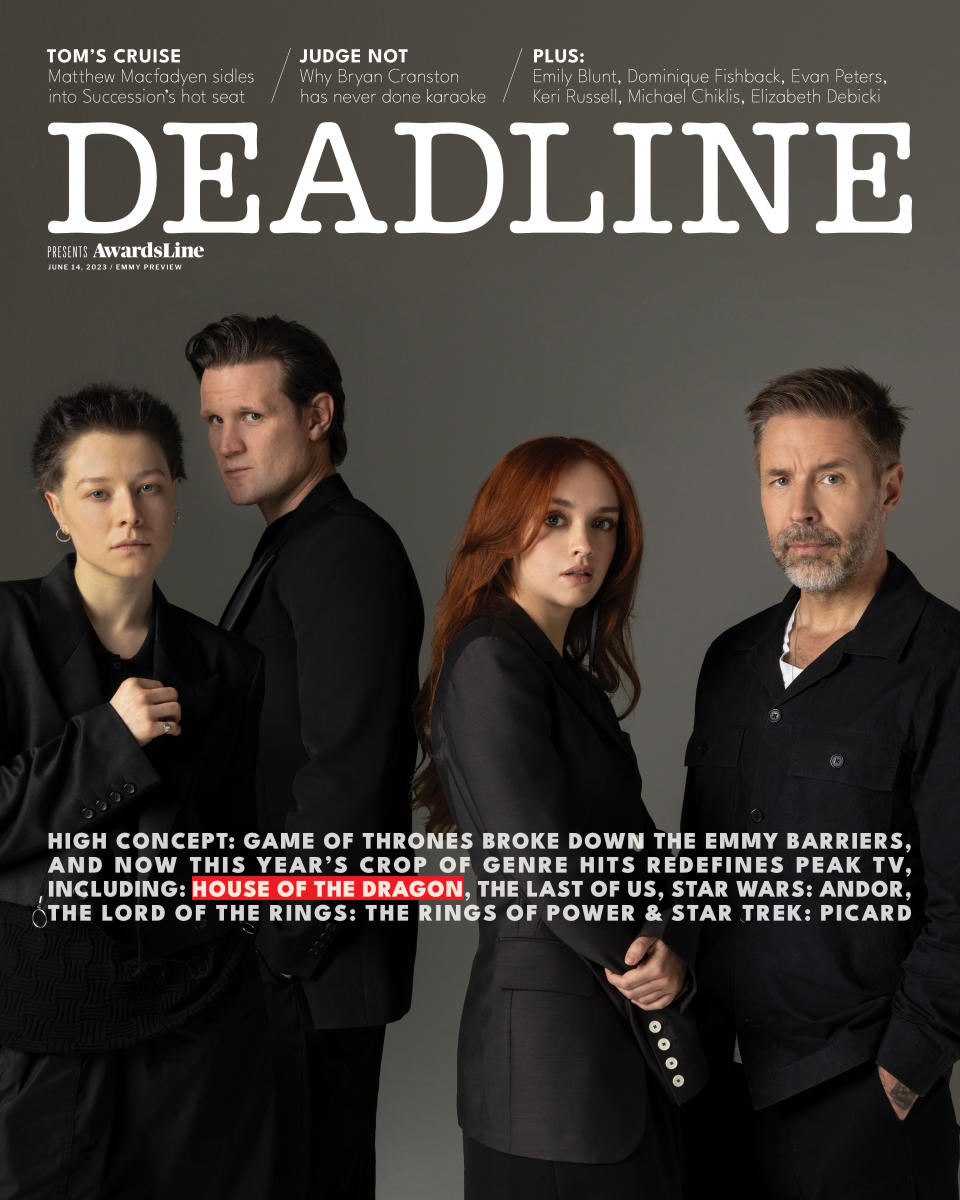
DEBICKI: I actually just wrapped on another thing that I was shooting. I was playing a part in MaXXXine, in the Ti West X trilogy. It was just so far from what I’ve been doing on The Crown, but just a joy as well. Acting is acting and I love doing it. I really feel so grateful when I get to go to work. That is the honest truth. Even just jumping onto Ti’s set for a second and just a totally different world with different people and just thinking, ‘I feel very fortunate to do what I do.’
I’ve also got a few little things simmering. I think I might just take a wee little rest because it’s been a long gig. I always say I’m going to do that, and then 48 hours later someone sends me a script and then I’m like, ‘OK, I’m going to Iceland.’
Best of Deadline
2023 Premiere Dates For New & Returning Series On Broadcast, Cable & Streaming
2023-24 Awards Season Calendar - Dates For Oscars, Emmys, Major Film Festivals, Guilds & More
Sign up for Deadline's Newsletter. For the latest news, follow us on Facebook, Twitter, and Instagram.

